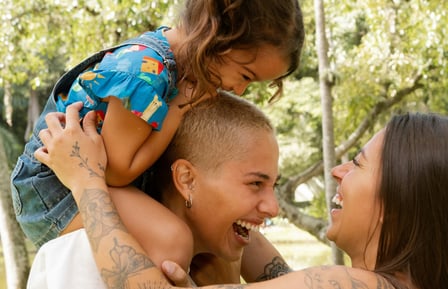Nice to meet you
When a child or young person joins your home, it’s a significant moment that can feel both exciting and overwhelming for everyone involved. As a carer, your role is to create a safe, supportive, and welcoming environment that helps the child feel valued and cared for from the very beginning.
Preparing for a placement
Every child entering care has a unique story, and their arrival might happen under varying circumstances. In some cases, they may come with only a few belongings. It’s a good idea to have some basic items ready to help them feel more comfortable on their first night:
.png?width=1000&height=266&name=Copy%20of%20Desktop%20Wallpaper%20(5).png)
- Toothbrush and hairbrush.
- A night light for their bedroom.
- Age-appropriate toys, books, or games.
- Some spare clothes or pyjamas.
If you’re caring for a baby, consider having nappies, formula, and a bottle on hand. Your caseworker can help provide essential items if needed, so don’t hesitate to reach out.
First impressions matter
Making a warm first impression is an important way for a placement to start. When the child or young person arrives:
- Greet them warmly and gently. A kind smile and calm energy can go a long way.
- Introduce yourself by name and ask what name they'd like you to call them. For older children, it may be appropriate to ask about their pronouns.
- Introduce them to other household members, including pets, if needed.
- Offer a tour of your home, showing them their room, the bathroom, and shared spaces like the kitchen or living room.
- Encourage them to personalise their room. This small act helps create a sense of ownership and comfort.
.png?width=1334&height=899&name=Copy%20of%20Desktop%20Wallpaper%20(6).png)
Understanding the journey
Children entering care often face intense and varied emotions: loss, uncertainty, fear, or sadness. They may feel disconnected from the people, places, and routines they’ve left behind. Their reactions can vary widely, from being quiet and withdrawn to expressing anger or appearing eager to please. These behaviours are not about you. They are a reflection of the child’s grief, confusion, or trauma. Being patient and empathetic is key to helping them settle in.
Little actions can make a big difference
-

Helping them adjust
Helping a child feel at ease involves small, thoughtful gestures:
- Food preferences
Ask about their favourite and least favourite foods. Familiar comfort foods can provide reassurance. - Household routines
Explain your daily routines, like when meals are served, bath time, or bedtime. Be flexible and give them time to adjust. Consider creating a visual schedule with their input to make routines easier to follow. - Setting expectations
Clearly and kindly explain family rules and boundaries. Provide simple tasks they can help with to encourage a sense of contribution and belonging.
- Food preferences
-

Creating a sense of belonging
Helping a child feel part of your home goes beyond the basics:
- Building your bond
- Spend time doing activities they enjoy or introducing them to new ones, like going on a hike or reading together.
- Building bonds with your family
- If you have children of your own, plan activities that help them bond with the child in your care.
- A neighbourhood tour
- Take the time to show them around your neighbourhood. Libraries, parks, and shops can all help them feel connected to their new surroundings.
-

Respecting privacy
Respecting a child's need for privacy:
Everyone deserves their privacy, including young people
It’s important to give children in care space to process their feelings. Avoid prying into their past or speaking negatively about their family. Respect their need for privacy and don’t involve them in conversations about their circumstances when others are present.
Be a kind, listening ear
If they wish to talk about their experiences, listen without judgment. Let them guide the conversation and be mindful of their emotions.
Remember
Welcoming a child into your home is a journey filled with both challenges and rewards. As you navigate the early days of a new placement, remember the incredible impact you’re making. Your care, patience, and kindness can provide the stability and support a child needs to begin healing and building a brighter future.
.png?width=448&name=Desktop%20Wallpaper%20(2).png)

